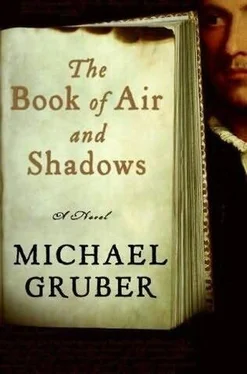The white boat steadily gained on them, and when they were less than twenty yards astern one of the men started to shoot at them. A bullet snapped overhead and left a long pink scar on the mahogany deck of the runabout. From behind, over the roar of the engine, Crosetti could hear the boy howling in fear.
Ahead and closing fast a line of small wooded islands extended from the eastern shore, to the left of which line stood a pole with a green light fixed to its top. Mishkin was pulling at his sleeve and pointing.
“Go between the marker and the last island!” he shouted. Crosetti twitched the wheel. The runabout whipped past the marker, struck a hidden rock with a jarring crash, ran another fifty feet, and then settled deep into the chilly waters. Crosetti struggled out from behind the wheel, grabbed a floating cushion, and went into the lake. Looking around, he saw the inverted stern of the runabout bobbing just above the surface, and beyond it an object that at first he did not recognize, but in a moment it came into focus as the front three-quarters of the Bayliner, floating on its side. With its deeper draft the pursuing craft must have hit the rocks even harder.
He saw a smaller white object, which he identified as Carolyn Rolly’s parka. She was floating face downward. He went underwater, undid the laces of his boots, pushed them off his feet, and, using the cushion as a float, kicked his way toward her. As he reached her, he saw the head of Jake Mishkin moving toward them with powerful strokes. Together, they got her turned around with her head and shoulders out of the water on the cushion.
“I got her,” cried Crosetti. “Where are your kids?”
At this a shocked look appeared on the other man’s face. He swiveled his head wildly and shouted. Some twenty-five yards away they saw a dark little shape appear amid splashing, the boy. Then it vanished. Jake pushed away toward the spot, but it was clear to Crosetti that the big man would never reach the child before he sank beyond reach. And then, from around the stern of the speedboat came a flash of water and a fast-moving shape-Imogen Mishkin doing a perfect crawl. She dived and reemerged with her brother, locked him against her chest in the approved Red Cross manner, and backstroked with him quickly to the nearest island.
Soon the five of them were all on the island, a hump of land not much bigger than a good-sized kitchen. Crosetti got Rolly on her back and blew into her mouth until she coughed and vomited up a quantity of water.
“Are you okay, Carolyn?” he asked.
“Cold.”
He put his arm around her. “We could pool our warmth, like this.”
She held herself stiffly. “I don’t see how you can bear to touch me.”
“Why? Because you screwed other men? I kind of knew that already. Only I would so appreciate it if you didn’t run away again. That’s the only thing about you that really annoys me. And the lying. I could do with less of that.”
“Besides that I’m perfect.”
“Pretty much. Oh, here’s the second climax.”
She looked and saw Shvanov and his henchman wading out of the water. Neither seemed any longer to be armed. The henchman was staggering and bleeding badly from a head wound, and Shvanov was holding his left arm at the elbow and grimacing in pain. Mishkin waited until they were knee-deep and then he waded up to Shvanov, batted away a feeble blow, grabbed him by belt and collar, lifted the man over his head and flung him at his henchman. Both men went down. He did it twice more until they got the idea and waded and swam to the next tiny island in the chain.
“You wouldn’t have done it that way, unless this was a comedy,” observed Crosetti. “The villain and the supporting lead would have a fight to the death and both of them would perish, or the villain would kill the supporting lead and then the hero would knock him off. But maybe this is a comedy. I was thinking it was a thriller. Here comes the cavalry, too late as usual.”
A helicopter thumped into view and hovered over the wreck. In the distance they could make out a pair of gray hulls approaching over the water, each with a bone in its mouth.
“State police,” Crosetti explained to Carolyn’s wondering look. “I called my sister the cop this morning, and she obviously arranged this rescue.”
“You could have called her last night, and the cops could have been waiting when we arrived.”
“No, I had to see that they were really coming. If I’d’ve brought the cops in earlier, Shvanov might’ve killed the kids. Or you. But, as you see, it all worked out.”
“Where’s Haas?” asked Carolyn.
“Shit!” said Crosetti, standing up and looking out over the water. “He’s gone. He couldn’t have survived, hurt the way he was. And the manuscript is gone too.”
“No,” said Carolyn, “linen paper survives for a long time in water, and gall ink is pretty tough. This lake probably isn’t that deep-if it was still in that mailer it should be okay until they send divers for it.”
“Maybe. But if Haas died it can’t be a comedy.”
“You know, you would be perfect too if you didn’t have that habit of making everything into a movie. If I stop lying and running away will you stop doing that?”
“Deal,” he said and kissed her cold lips, thinking: fade to black, music up, roll credits.
Ifound this document while I was transferring files to my new laptop and have decided to add this coda. Clearly, the public end of this affair-the lost play, the miraculous Bracegirdle-Shakespeare mss., the involvement of Shvanov, the scene at the cabin, the fate of Mickey Haas-has been too heavily reported to bear repeating here, but I do want to tie up my own loose ends, so that, if some digital explorer of the future comes across this file, as we did poor Bracegirdle’s last letter, there will be some closure.
Sorry to say, Amalie and I are not, as of the current date, which is June 10, back together, although I still have hopes. She is often in the city, and when she is we are much together and fairly amicable. We attended Easter services this year at St. Patrick’s and it affected me deeply, and she noted this, and she gave me a smile such as I have not had from her for a good while. And I suppose it was also because I am entering the eighth month of the longest period of celibacy I have experienced since Miss Polansky had me in the staff room of the Farragut Branch library. Amalie can no longer smell (or sense in some more mystic way) the taint of adultery on me, and it is, I think, bringing her around. I believe that my curse began lifting at the very moment, in the cold water of Lake Henry, that Crosetti drew my attention to the fact that I was trying to save a mythical woman rather than my children. And the sight of my daughter risking her own life to save her brother, whom I thought she despised. This event put into my mind that I might be wrong about every single emotional relationship in my purview, and that I should, instead of trying to be clever, simply pump out as much love from my tiny store as I could, whether or not it is reciprocated. This I have tried to do.
I am also happy to say that I attended my daughter’s performance in A Midsummer Night’s Dream (a smash, by the way, she stole the show) without nausea, and while I will perhaps never be a theater aficionado, that particular neurotic tic seems to be over. I spend a good deal of time with Niko, mainly sitting quietly with him, but a few months ago he asked if I would teach him to swim, and also to lift weights. He will still not look directly at me, but sometimes, when I touch him, he does not shrink away.
Paul is back in his mission, properly humbled and terribly affected by the death of Mickey Haas, although I have told him repeatedly that this was my fault and not his. All I had to do was call the police and tell them the whole story, and they would have investigated, and Pascoe’s lies would have surfaced immediately and everything would have worked out fine, the letters and play authenticated, etc. That Pascoe! A Yank priest shows up and asks if he knows anything about a forged unknown play by Shakespeare and of course he says, Oh, yes, Father, done it myself, didn’t I, and for fifty grand I’ll tell you the whole thing. And Paul fell for it; I suppose there is such a thing as being too clever, too suspicious.
Читать дальше












